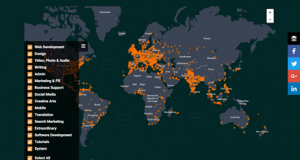Google’s Fix For Search Monopoly: Choice, Performance Driven By Curiosity

Humans are curious. Their longing to question, speculate and doubt has made search and advertising much more difficult to accomplish successfully. Sometimes it is preference, and other times it is bias. Will we see a Google reset?
Some of the smartest people working at Google have spent years working to fulfill the need to answer questions, which leads me to ask: how do you stifle a company that in so many ways seems to have strategies to fulfill human curiosity — whether it’s answering questions or buying products.
Google made dozens of AI-related announcements this year, from generative AI in health and media buying to its quantum chip called Willow.
You would think a company that has been so successful in capturing market share could find the answer to make the industries it participates in more competitive. However, that would mean giving up revenue.
Google on Friday filed proposed remedies to the antitrust lawsuit with the Department of Justice (DOJ) in a blog that explained alternative actions the DOJ could take and the reasoning behind its response. The company attempted to explain why the sale of Chrome does not fit into the judge’s description of its illegal conduct, which focused on exclusive contracts with browsers such as Apple, smartphone manufacturers and telecom carriers.
The court filing was made public late Friday. The Court’s liability determination covered Google’s search-engine distribution and promotion agreements with Android mobile device manufacturers and wireless carriers and Google’s default search-engine agreements with browser developers Apple and Mozilla.
The Court concluded agreements with Apple and Mozilla were exclusive and stifled competition in traditional search and paid text ads.
Google’s solution would give these developers “greater flexibility to set rivals as defaults and guarantees annual contestability where a developer chooses to set Google as the default search engine for a particular operating system version of its browser or browsing mode.”
Google defined that flexibility as choice — giving browser developers a choice and making the agreements annual contracts. This would enable browser developers to change the default annually. It would make browser default agreements non-exclusive and contestable on a regular basis.
Google’s proposal also includes provisions that address generative AI chatbot products. This would alleviate concerns that it could “employ exclusive distribution agreements to obtain preload of its Gemini Assistant chatbot mobile application.
Suggestions were made to make Android contracts with OEMs non-exclusive and allow them to unbundle the Google Play Store from Google Search and Chrome. It would provide flexibility in preloading multiple search engines and preloading any Google app independently of Google Search or Chrome. Again. The company said this would give Google partners additional flexibility and rivals like Microsoft more chances to bid for placement.
Google also provided suggestions that Android partners could license Google Play, Search, and/or Chrome without also licensing Google’s Gemini Assistant mobile application. Google’s PFJ further prohibits it from conditioning consideration on a partner refraining from the preload of rival generative AI assistive chatbot services.
These provisions address the potential for generative artificial intelligence chatbots to become substitutes for general search engines.
(4)
Report Post




